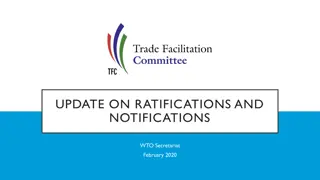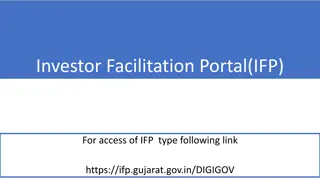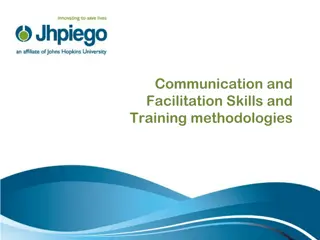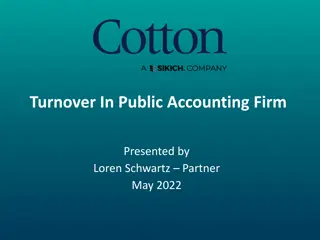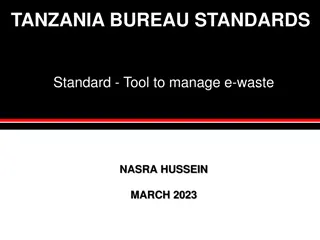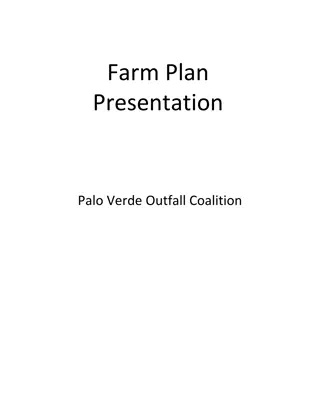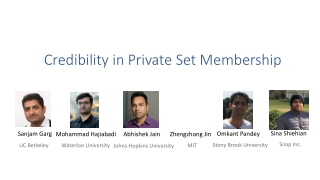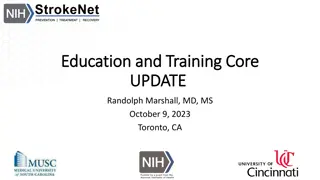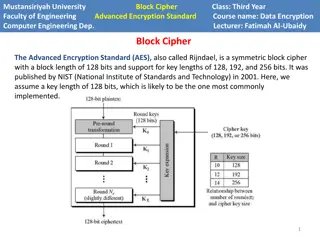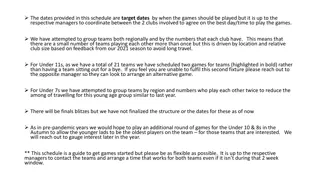Schwartz Rounds Facilitation Best Practices
Explore the key aspects of facilitating Schwartz Rounds effectively, from preparing panelists to guiding discussions and concluding sessions. Learn about the role of a facilitator and the important phases in the process. Gain insights into cultivating facilitation skills and discover additional resources for Schwartz Rounds facilitators.
Download Presentation

Please find below an Image/Link to download the presentation.
The content on the website is provided AS IS for your information and personal use only. It may not be sold, licensed, or shared on other websites without obtaining consent from the author. Download presentation by click this link. If you encounter any issues during the download, it is possible that the publisher has removed the file from their server.
E N D
Presentation Transcript
Schwartz Rounds Facilitation Nuts & Bolts A Schwartz Center Office Hours Webinar August 13, 2018 1
Your Moderator & Host Stephanie Adler Yuan Director, Education & Training 2
Audience Reminders You may submit a question by typing it into the Questions pane at the right of your screen at any time. Please respond to audience polls by clicking on the answer of your choice. We value your feedback! Please complete our survey following the webinar. 3
Your Co-Hosts Beth Lown, MD Chief Medical Officer Kathy Scopin, RN Member Experience Advisor 4
Todays Webinar The Role of the Schwartz Rounds Facilitator Phases of Schwartz Rounds Facilitation: Before, During, After Cultivating Your Facilitation Practice: Characteristics & Behaviors Additional Resources for Schwartz Rounds Facilitators Q&A 5
The Many Hats of a Schwartz Rounds Facilitator... 6
Teacher Host Ringmaster Conductor Role Model 7
What is the role of a Schwartz Rounds Facilitator? 8
Breaking It Down: The Role of the Schwartz Rounds Facilitator Before Schwartz Rounds Prepare the panelists = prepare yourself During Schwartz Rounds Introduce the session; set the tone Support panelists Guide discussion Wrap it up After Schwartz Rounds Debrief with panelists and Planning Committee Review evaluations to inform planning 9
Before: Preparing the Panelists What to Cover Purpose of Schwartz Rounds Role of panelists What & how Non-verbal cues Your support Panelist story Comfort level with public speaking Any questions? 11
Before: Preparing the Panelists Three Guiding Principles 1. I know the patient s story. I want to hear your story. 2. Focus on speaking in first person and using feeling words. NO: That situation was really sad. YES: I felt sad. 3. Make the panelists feel comfortable and safe: How can I help you tell your story? 12
Before: Preparing Yourself Develop a game plan. Consider using nonverbal cues with panelists. Consider questions, prompts, themes for session. Anticipate challenges. Define speaker order. 13
During: Introduction Coordination with Physician Leader, co-Facilitator Purpose of Schwartz Rounds This is for us. Context The Schwartz Center, Ken s Story Ground Rules Electronic devices, confidentiality, respectful listening, safe space What to Expect Introduce Topic and Panelists 14
Some Thoughts on Co-Facilitation 16
During: Working with Participants Managing content AND process Mechanics: Keeping time and calling on people Modeling behaviors of compassionate caregivers Schwartz Rounds at Harvard Vanguard Medical Associates, Cambridge, MA 17
During: Wrapping It Up Leave time to button everyone back up. Remind participants to fill out evaluations. Express gratitude to participants, panelists, Planning Committee members. Highlight relevant resources for additional information support. Offer moment for reflection or reiterate themes of discussion. 18
During: Closing Thoughts on Compassion Compassion can come from anyone, at any time. We care for family members as much as we do patients. Seeing the patient as a person, not a case Appreciating the perspectives, experiences, and contributions of colleagues Value of teamwork, supporting one another Importance of and strategies for self-compassion, self-care Feelings happen. 19
After: Debriefing Schwartz Rounds Check in with panelists. Review session and evaluations with Planning Committee. Designate a Planning Committee member to follow up with any participant who seemed challenged by the session. 20
Cultivating Your Facilitation Practice 21
Modeling Behaviors Respect Appreciation Curiosity Nonjudgmental positive regard Active, reflective listening Patience, comfort with silence Tolerance of uncertainty 23
Facilitation Techniques Ask questions Name the feeling Reflect Connect Include Recognize Use silence Schwartz Rounds at Harvard Vanguard Medical Associates, Cambridge, MA 24
Managing the Flow Manage derailments Keep discussions focused on emotions and experiences, away from problem-solving. Manage time Signal the impending end of the session: We have time for one more comment. Acknowledge at session s end that not everything will have been said. 25
Managing Silence https://outset.org.uk/supported-projects/jane-and-louise-wilson Center yourself Tolerate several seconds of silence Be curious Gently wonder what the silence may be about Offer a question 26
Building Deepening Ask for clarification Reflect back the essence of what you ve just heard Listen for deeper, underlying themes I m hearing Does anyone see this differently? What if ? Could it be possible that ? What struck you? What are you feeling now? What are your thoughts? Have you had similar experiences? What resonates? 27
Responding to Emotions I hear in your voice You sound frustrated Hold the emotions or the silence Stand near by 28
Managing Derailments www.bostonmagazine.com Thank you for that comment. Let s remember the goals of Schwartz Rounds I wonder if we can set that aside for the time being. 29
Moving Toward Closure Begin to move from inward-looking reflection to community Whom do you turn to for support? How do you support each other? What have you found to be helpful in these situations? What strategies have you used? 30
Fostering a Schwartz Rounds Culture Open forum Cultivate respect for and recognition of multiple perspectives Courage to discuss our human reactions and vulnerabilities Recognize that there may not always be a 'right' or 'wrong' answer Appreciate the complexity of clinical relationships Acknowledge our shared humanity we are all deserving of compassion 31
Additional Resources for Schwartz Rounds Teams 32
Resources Member Community Website Facilitation Training Videos Topic Database Past Office Hours Webinars FAQ To register for access, email Anna Ferrato for your organization code at aferrato@theschwartzcenter.org Programs & Events Compassion in Action & Office Hours Webinars Facilitation Workshops Compassion in Action Conference: September 8-10, 2019 Your Member Experience Advisor 33
Q&A Please type your questions into the Questions pane on your screen. 34
Thank you for participating in today s session. We love your feedback. Please take a moment to complete our survey upon exiting today s program. 35








